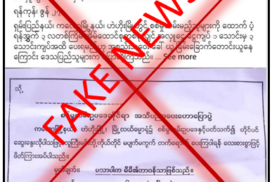By U AC
The story of February has not been about how the weather is turning from a nice cooling morning to scorching hot afternoons. It is also not on the expectations gap between the change that we were expecting on 1 February and the reality of the lack of changes in the new cabinet. Even the atrocities of the AA (Arakanese Army) terror group, killing close to one thousand innocent family members of military personnel along a river just north of Sittway, did not stay in the headlines for too long.
The digital news headlines, Facebook and fake news outlets have bombarded everyone with the initiation of compulsory national military service for all eligible citizens of Myanmar. First, let us get the fake news out of the mainstream.
1. Even though there are stories of allegedly being forced into service in some towns and villages (local term: getting ‘porters’), I personally followed up on some of these stories, and no corroborative evidence has been found to support these allegations.
2. Running away to a foreign land is not the solution. Myanmar people tend to panic and overreact at even the slightest rumour, and social media posts have been about how to migrate overseas to avoid the service. Unless the Thai, Singapore, US, or UK governments would give their passports away in a bonanza to anyone from Myanmar for simply claiming to be a political dissident and showing a picture taken together with Su Kyi, this isn’t going to work. As long as you still need to renew or extend your passport, even evasion of two per cent tax on overseas income is not doable, let alone evading the national service.
3. And you are not getting sent to the frontlines to help out the numbers in the combats in the border regions. With the current shortage of government budget, depreciating kyats, and high cost of military weapons, you would have to be super lucky to have a chance to throw a grenade individually during your training. The first year would be simply basic military training and doing mundane tasks like cleaning, carrying things, and repairs and maintenance, and in the second year, you would perhaps be shown how to handle a weapon. There is fat hope for those who want to get shipped out to get into some action.
4. The chances of getting selected are really slim. That is a fact. There are 13 million eligible citizens who fall into the specified age range. Yet, with the call-up rate at 5,000 persons a month, the chances of getting selected (<0.04 per cent) may be at worse odds than winning a lottery of some kind. So, fret not. It probably could NOT be you!
The question is not whether we need mandatory national military service but why we should not have it! Consider South East Asia. Our neighbouring Laos, Viet Nam and Thailand have it. Singapore has it. Only countries with larger populations, such as India, China, Bangladesh, Indonesia, etc., are going without the mandated conscription. Even Koreas have it. Why should we not have it, especially under the current circumstances, especially when the rebel forces are strong, terrorist activities are rampant across this vast land, and the public needs to be educated on how to defend their towns and villages against these threats.
What benefits would we get?
Mandatory national service would foster unity and bring people from diverse backgrounds together. Think of why Tatmadaw is the strongest institution in Myanmar: because of the band of brothers getting together to protect the motherland.
Compulsory service would save the government money and provide benefits to all citizens. In an era of high unemployment (other than farming), it would provide an avenue for youth to burn their time and energy into productive activities during the two years of service. Plus, after they leave the service, they will be equipped with a mindset of good work ethics, unity, and national defence in order to protect their towns and villages against all threats.
Performing national service would help young people mature and serve as a bridge to adulthood. Instead of wasting their youths at tea shops, playing video games, watching porn or getting addicted to social media, they would become responsible adults by being in service and be proud that they have served the nation.
The beneficial side effect of this, at the end of the day, would be the downright segregation of the population: those who love the country and want to serve and be counted upon and those who want to selfishly get what they want out of this land and spend it overseas and eventually migrate.
What do we lose out?
Research has shown that compulsory conscription service is negative to economic growth, as it takes away a certain percentage of productive workers from the economy. Obviously, this theory has certain assumptions, such as the country has a certain level of youth employment, and there is little or no involuntary unemployment. Neither of these is applicable to youth in Myanmar, unfortunately. Hence, the positive externalities are expected to exceed this somewhat negative economic impact.
Mandating national service might infringe on the freedom to choose what to do with our lives. Yet, the plan has been in place and agreed upon at least ten years ago. People’s Military Service Law was already in place in November 2010. SAC only set the date (10 February) for the law to come into force. National interest must always come before individual interests, and the little freedom that we give away for the greater good of the nation could be the most altruistic action one has ever performed in a lifetime.
A mandatory service programme could be manipulated by the rich and unfairly harm others. Even in countries such as Korea, they are called ‘sons of gods’ – the number of those kids of rich and powerful families who somehow get exemption from service is always greater than those from ordinary backgrounds. Be it due to corruption or abuse of power, Myanmar has to watch out for abuse of the exemption rules from service.
In the meantime, SAC spokesman Maj-Gen Zaw Min Tun confirmed on 20 February that there would be no female recruitment for the year 2024 and only suitable war veterans would be assigned for military service under Reserve Forces Law (refuting the misinformation that all veterans are being recalled to serve).













